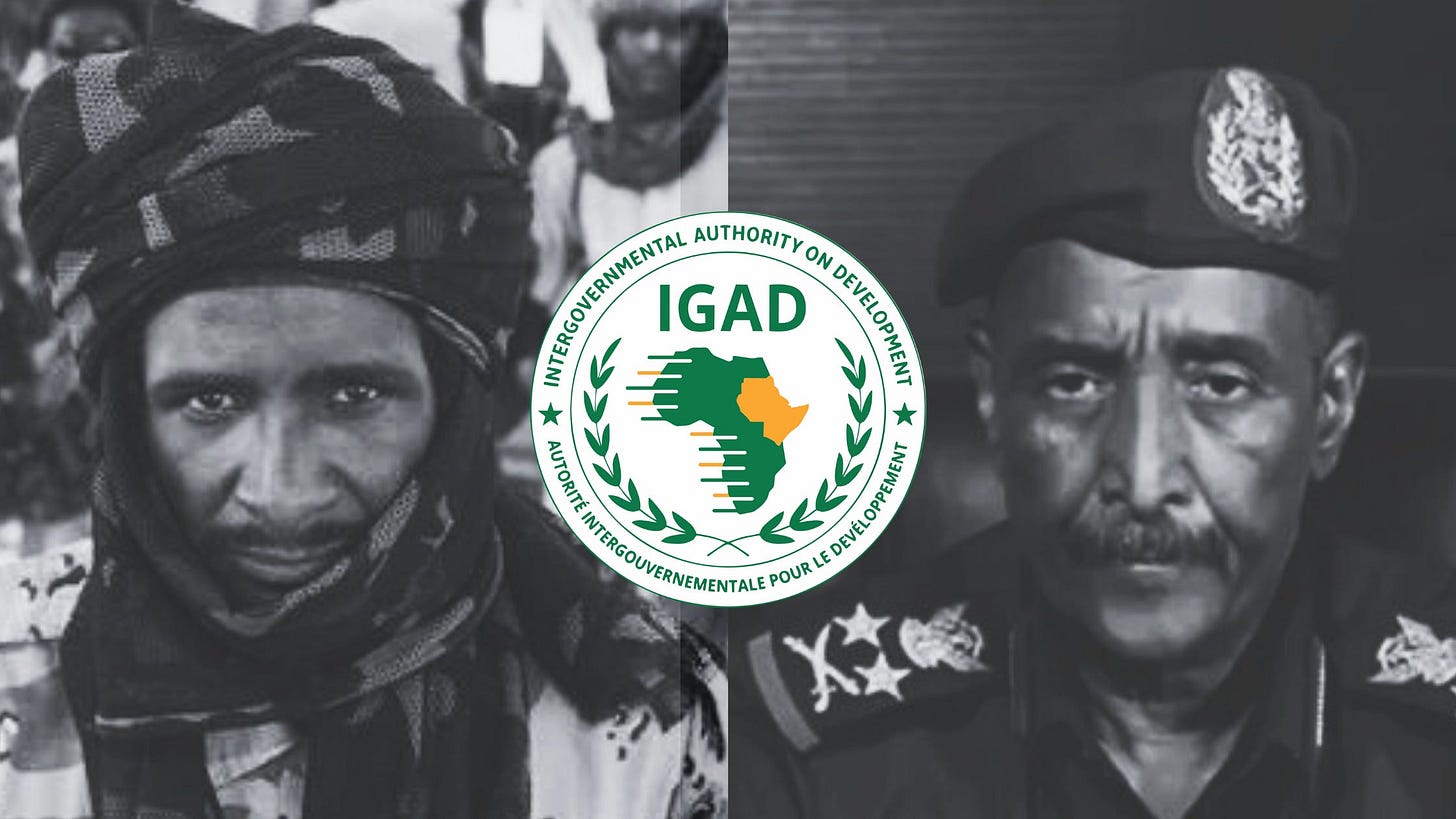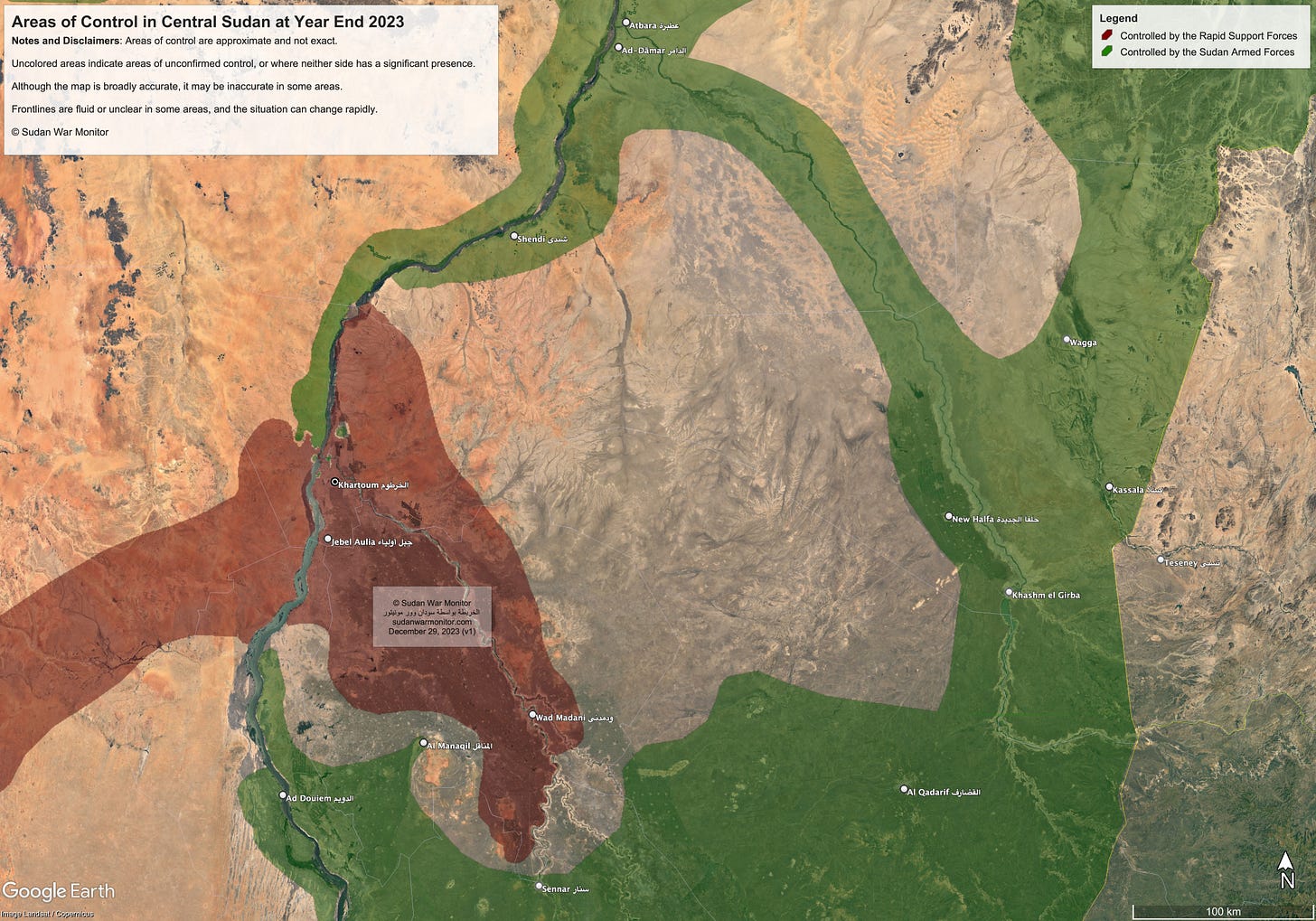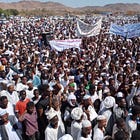Lull in fighting ahead of East African summit
Dagalo to attend IGAD summit while Al-Burhan boycotts
Fighting has eased in Sudan ahead of a summit of East African leaders, scheduled to take place in Uganda tomorrow to discuss the crisis in Sudan. Both militaries, the Sudan Armed Forces and the rival Rapid Support Forces, remain in a phase of consolidation, in preparation for further fighting in new areas of the country.
East Africa’s IGAD bloc—which includes Kenya, Ethiopia, Uganda, and Djibouti, among others—has taken the lead in mediating Sudan’s conflict after Western and Saudi diplomacy largely ceased, following the outbreak of war in Gaza.
IGAD announced several breakthroughs at a summit in Djibouti on December 9, but both warring parties subsequently walked back their commitments, and fighting escalated in mid-December, before calming in recent weeks.
The diplomatic efforts of the regional bloc have faltered recently after repeat failures to bring together the leaders of the two warring parties for a one-on-one meeting.
The IGAD approach, driven by well-publicized personal diplomatic efforts of key heads of state, including Kenya’s President William Ruto and Djibouti’s President Ismaïl Omar Guellé, contrasts with the diplomatic process of the United States and Saudi Arabia, which last year co-facilitated several rounds of quiet, mostly private talks with lower-level delegations of the two sides in Jeddah, Saudi Arabia.
Tomorrow’s meeting was originally scheduled to take place December 28, attended by both the RSF leader Mohamed Hamdan Dagalo and the Sudan Armed Forces leader, Abdel Fattah al-Burhan. It was cancelled after Dagalo snubbed Burhan, failing to turn up and carrying out his own diplomatic tour instead.
The paramilitary leader was given a presidential welcome in Kenya, Ethiopia, and Uganda, souring relations between Sudan and the East African bloc. Sudan’s foreign ministry announced yesterday it would freeze its dealings with IGAD, in protest of Dagalo’s attendance at the upcoming summit in Kampala.
Sudan’s sovereignty council—the top body of the ruling military junta—announced that Al-Burhan would not attend the summit, saying in a statement January 13,
“We continued to deal positively with all initiatives, especially IGAD’s efforts to reach peace in Sudan. However, IGAD did not commit to implementing the outcomes of the last summit in Djibouti… and did not provide a convincing justification for canceling the meeting that IGAD called for December 28, 2023, under the pretext that the rebel leader [Dagalo] was unable to attend for technical reasons while he was touring a number of IGAD countries on the same date.”
“The Sudanese government believes that there is no need to hold a summit to discuss Sudan before implementing the outcomes of the previous summit.”
“We renew our affirmation that what is going on in Sudan is an internal matter and that our response to regional initiatives does not mean giving up our sovereign right to solve the Sudan problem by Sudanese.”
Dagalo, meanwhile, is playing the statesman, claiming to want peace in Sudan. Yesterday he issued a statement that said in part, “I would like to emphasize the commitment of the Rapid Support Forces to negotiations, dialogue, and peace with the objective of charting a new and better future of Sudan... We expect the same level of commitment from our counterparts.”
A coalition of civilian politicians, known as Tagaddum, headed by former Prime Minister Abdalla Hamdok, is also expected to attend tomorrow’s summit.
Latest military developments
Militarily, the current situation reflects a period of relative calm, consistent with our forecast December 22 that the RSF, after its rapid advance into Al Jazirah State, “may take a little more time to consolidate its position and plan its next move.”
Sporadic fighting and shelling continued in Khartoum and other frontline areas, but no further battles were reported in the flashpoint Kordofan region or elsewhere.
There have been no major territorial gains in recent days. Last week, the army made some incursions into RSF territory in Omdurman—a zone of heavy urban combat for months—but reports that they gained ground are significantly exaggerated. Apart from minor engagements, no major combat operations have occurred recently.
The Sudan Armed Forces continued to build up forces in Shendi, White Nile, Gezira State, and other areas where it is feared that the RSF could attack next. They are also distributing weapons to civilians in various areas.
Sources from Al-Manaqil reported to Sudan War Monitor that an army helicopter has been transporting weapons continuously to the city for more than a week, most recently two days ago, with some army officers and security personnel distributing them to citizens. Al-Manaqil is the only major town in Al Jezirah State still under control of the Sudan Armed Forces, as shown on the below map.
Sudan’s military leaders came under intense criticism last month, including from the influential Islamic Movement, prompting them to cave to demands for aggressive mobilization of civilian militias.
Related coverage:
Despite the lull in fighting, the Sudan Armed Forces have continued to carry out airstrikes in various areas, including last night in Zurrug, a North Darfur town considered the hometown of the extended family of Mohamed Hamdan Dagalo.
On social media, unofficial RSF accounts are making continuous threats of invading different areas, including Sennar, Northern State, White Nile State, and River Nile State. Sometimes, they share videos of columns of combat vehicles on the move, claiming to show attacking forces on the way toward one of these destinations.
The purpose of this propaganda is threefold. First, it aims to leave the enemy guessing as to where the next attack will come. Second, it serves a political purpose of sowing fear and discouraging the enemy’s mobilization and recruitment efforts. Third, it aims to motivate RSF troops with the promise of impending victory.
If another attack happens, it could come with little if any warning. As demonstrated by the invasion of Al Jazirah State last month, the RSF can strike far and fast. They moved through the night on December 15, outflanking army positions along the Nile, and arriving that morning on the outskirts of the state capital Wad Madani. The city fell three days later.
Reconnaissance units of the RSF recently were spotted as far north as Musawwarat, an archaeological site about 30 km south of the city of Shendi, amid reports of a military buildup in Shendi. Although the RSF have consistently entered southern parts of River Nile State, Musawwarat is farther north than they have gone before.
Separately, in White Nile State, RSF troops were seen in the Ad-Douiem area today—again, possibly carrying out reconnaissance. And in northwest Khartoum State the RSF have roamed north along the Dongola highway. By crossing the desert in that area, they could raid Nile Valley settlements anywhere between Merowe and Dongola.




